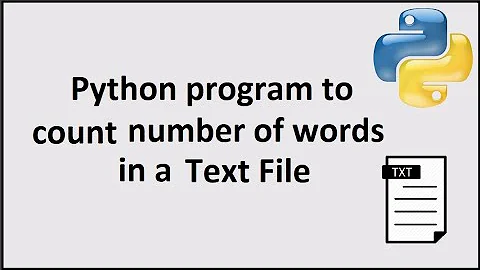How do I count the number of occurrences of a word in a text file with the command line?
Solution 1
$ tr ' ' '\n' < FILE | grep WORD | wc -l
Where tr replaces spaces with newlines, grep filters all resulting lines matching WORD and wc counts the remaining ones.
One can even save the wc part using the -c option of grep:
$ tr ' ' '\n' < FILE | grep -c WORD
The -c option is defined by POSIX.
If it is not guaranteed that there are spaces between the words, you have to use some other character (as delimiter) to replace. For example alternative tr parts are
tr '"' '\n'
or
tr "'" '\n'
if you want to replace double or single quotes. Of course, you can also use tr to replace multiple characters at once (think different kinds of whitespace and punctuation).
In case you need to count WORD but not prefixWORD, WORDsuffix or prefixWORDsuffix, you can enclose the WORD pattern in begin/end-of-line markers:
grep -c '^WORD$'
Which is equivalent to word-begin/end markers, in our context:
grep -c '\<WORD\>'
Solution 2
With GNU grep, this works: grep -o '\<WORD\>' | wc -l
-o prints each matched parts of each line on a separate line.
\< asserts the start of a word and \> asserts the end of a word (similar to Perl's \b), so this ensures that you're not matching a string in the middle of a word.
For example,
$ python -c 'import this' | grep '\<one\>' There should be one-- and preferably only one --obvious way to do it. Namespaces are one honking great idea -- let's do more of those! $ python -c 'import this' | grep -o '\<one\>' one one one $ python -c 'import this' | grep -o '\<one\>' | wc -l 3
Solution 3
This unfortunately does not work with GNU coreutils.
grep -o -c WORD file
If it works on your platform, it's an elegant and fairly intuitive solution; but the GNU folks are still thinking.
Solution 4
sed -e 's/[^[:alpha:]]/ /g' text_to_analize.txt | tr '\n' " " | tr -s " " | tr " " '\n'| tr 'A-Z' 'a-z' | sort | uniq -c | sort -nr | nl
This command makes the following:
- Substitute all non alphanumeric characters with a blank space.
- All line breaks are converted to spaces also.
- Reduces all multiple blank spaces to one blank space
- All spaces are now converted to line breaks. Each word in a line.
- Translates all words to lower case to avoid 'Hello' and 'hello' to be different words
- Sorts de text
- Counts and remove the equal lines
- Sorts reverse in order to count the most frequent words
- Add a line number to each word in order to know the word posotion in the whole
For example if I want to analize the first Linus Torvald message:
From: [email protected] (Linus Benedict Torvalds) Newsgroups: comp.os.minix Subject: What would you like to see most in minix? Summary: small poll for my new operating system Message-ID: <[email protected]> Date: 25 Aug 91 20:57:08 GMT Organization: University of Helsinki
Hello everybody out there using minix –
I’m doing a (free) operating system (just a hobby, won’t be big and professional like gnu) for 386(486) AT clones. This has been brewing since april, and is starting to get ready. I’d like any feedback on things people like/dislike in minix, as my OS resembles it somewhat (same physical layout of the file-system (due to practical reasons) among other things).
I’ve currently ported bash(1.08) and gcc(1.40), and things seem to work. This implies that I’ll get something practical within a few months, and I’d like to know what features most people would want. Any suggestions are welcome, but I won’t promise I’ll implement them 🙂
Linus ([email protected])
PS. Yes – it’s free of any minix code, and it has a multi-threaded fs. It is NOT protable (uses 386 task switching etc), and it probably never will support anything other than AT-harddisks, as that’s all I have :-(.
I create a file named linus.txt, I paste the content and then I write in the console:
sed -e 's/[^[:alpha:]]/ /g' linus.txt | tr '\n' " " | tr -s " " | tr " " '\n'| tr 'A-Z' 'a-z' | sort | uniq -c | sort -nr | nl
The out put would be:
1 7 i
2 5 to
3 5 like
4 5 it
5 5 and
6 4 minix
7 4 a
8 3 torvalds
9 3 of
10 3 helsinki
11 3 fi
12 3 any
13 2 would
14 2 won
15 2 what
16 ...
If you want to visualize only the first 20 words:
sed -e 's/[^[:alpha:]]/ /g' text_to_analize.txt | tr '\n' " " | tr -s " " | tr " " '\n'| tr 'A-Z' 'a-z' | sort | uniq -c | sort -nr | nl | head -n 20
Is important to note that the command tr 'A-Z' 'a-z' doesn't suport UTF-8 yet, so that in foreign languages the word APRÈS would be translated as aprÈs.
If you only want to search for the occurency of one word you can add a grep at the end:
sed -e 's/[^[:alpha:]]/ /g' text_to_analize.txt | tr '\n' " " | tr -s " " | tr " " '\n'| tr 'A-Z' 'a-z' | sort | uniq -c | sort -nr | nl | grep "\sword_to_search_for$"
In a script called search_freq:
#!/bin/bash
sed -e 's/[^[:alpha:]]/ /g' text_to_analize.txt | tr '\n' " " | tr -s " " | tr " " '\n'| tr 'A-Z' 'a-z' | sort | uniq -c | sort -nr | nl | grep "\s$1$"
The script must be called:
search_freq word_to_search_for
Solution 5
Depending on whether you'd like to match the word in the keys or in the values of the JSON data, you are likely to want to extract only keys or only values from the data. Otherwise you may count some words too many times if they occur as both keys and values.
To extract all keys:
jq -r '..|objects|keys[]' <file.json
This recursively tests whether the current thing is an object, and if it is, it extracts the keys. The output will be a list of keys, one per line.
To extract all values:
jq -r '..|scalars' <file.json
This works in a similar way, but has fewer steps.
You may then pipe the output of the above through grep -c 'PATTERN' (to match some pattern against the keys or values), or grep -c -w -F 'WORD' (to match a word in the keys or values), or grep -c -x -F 'WORD' (to match a complete key or value), or similar, to do your counting.
Related videos on Youtube
mythz
Updated on September 17, 2022Comments
-
mythz over 1 year
I have a large JSON file that is on one line, and I want to use the command line to be able to count the number of occurrences of a word in the file. How can I do that?
-
 Kusalananda about 5 yearsIt is unclear whether the word should be matched in both keys and values of the JSON data, i.e. whether
Kusalananda about 5 yearsIt is unclear whether the word should be matched in both keys and values of the JSON data, i.e. whether{ "key": "the key" }should count the stringkeyonce or twice.
-
-
mythz over 13 yearswhat if there are no spaces, i.e. the field name is surrounded by quotes? e.g. "field"
-
maxschlepzig over 13 years@mythz: Then you replace the quotes with newlines with tr. I'll update the answer.
-
mythz over 13 yearsyep did the trick :)
-
sam hocevar about 13 yearsThis answer is incorrect in many ways. It is vague: you should explain how to come up with a
trcommand that does the job instead of suggesting examples that will never work in all situations. It will also match words that contain the word you are looking for. Thegrep -o '\<WORD\>' | wc -lsolution is far superior. -
maxschlepzig about 13 years@Sam, the question leaves it kind of open, if a searched word should be searched like 'WORD' or '\<WORD\>' - you can read it both ways. Even if you read it the 2nd way and only in the 2nd way, then my answer would be only incorrect in 1 one way. ;) And the 'grep -o' solution is only superior, if it supports the -o option - which is not specified by POSIX ... Well, I don't think so that the use of tr is that exotic to call it vague ...
-
taffer over 11 yearsI like this one. Very simple and elegant.
-
 tripleee over 8 yearsMy bad, the bug is still open: savannah.gnu.org/bugs/?33080
tripleee over 8 yearsMy bad, the bug is still open: savannah.gnu.org/bugs/?33080 -
 Electro over 7 yearsToo bad this would have been the most elegant
Electro over 7 yearsToo bad this would have been the most elegant -
 phk over 7 years
phk over 7 yearssed: -e expression #2, char 7: unterminateds' command`, also this counts all words, right? But OP asked only a particular one. Also a bit of explanation would be nice. -
Roger Borrell over 7 yearsSorry I had a mistake. I have remade the command plus commented the answer. In my opinion, from the question, it's impossible to know wether he would like to get the ocurrency of only one word or a frequency of occurencies. But in case you would like to get only one word you can add a grep at the end.
-
 ThisaruG about 7 yearsThis worked for me !
ThisaruG about 7 yearsThis worked for me ! -
Pierre B about 6 yearsThis is wrong. This counts the number of lines with the pattern WORD. The OP wants the total number of occurrences.
-
 tripleee about 6 years@PierreB That's why I'm saying GNU
tripleee about 6 years@PierreB That's why I'm saying GNUgrephas a bug here. It's not clear from POSIX what the semantics of combining-cand-oshould be so this is currently not portable. Thanks for the comment; I have updated this answer. -
 Stéphane Chazelas about 6 yearsOr just
Stéphane Chazelas about 6 yearsOr justgrep -wo WORD | wc -l -
 G-Man Says 'Reinstate Monica' about 5 yearsOr just
G-Man Says 'Reinstate Monica' about 5 yearsOr justawk '{sum+=gsub("praveen","")} END {print sum+0}'. -
Praveen Kumar BS about 5 yearsLet me know why down vote for my answer
-
maxschlepzig about 5 years@Kusalananda, well, it's still an occurrence. But if you don't want to count such substring matches then please read the last paragraph of my answer and my previous comment here.




